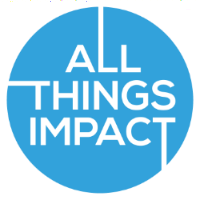Hi friends,
This is a newsletter of interesting things I've seen from across the spectrum of impact: effective philanthropy, impact investing (in the private markets), responsible investing (in the public markets) and a wildcard topic. See more at All Things Impact.
Here are four links worth your time:
1. Effective philanthropy: If not overhead, then what? Maybe this.
Marc Gunther’s excellent Nonprofit Chronicles site continues to deliver. Here is his take on noted Yale economist (and founder of Innovations for Poverty Action) Dean Karlan’s latest project, ImpactMatters, which
"has devised a plan to do “impact audits” of charities that are analogous to financial audits. The audits will focus on four elements: transparency, cost-effectiveness, cooperation with others and “theory of change.” Charities will pass or fail the audits; failed audits will be kept confidential to encourage more charities to participate… the philanthropy market, such as it is, desperately needs disruption. We’d all be better off if high-performing nonprofits captured a bigger share of the $350 billion or so that Americans give to charity each year.”
While hopeful, Gunther sees three challenges ahead for the approach ImpactMatters is taking:
1. Will it scale? (they have currently only posted audits for four charities, out of over 1.5 million in the US alone)
2. Will donors actually use these audits to inform decision making? (“much giving is done with the heart”)
3. Will there be limits to what data can measure? (e.g. advocacy efforts)
2. Impact Investing: Omidyar Network says "We're At A Tipping Point For Impact Investing"
Paula Goldman of the Omidyar Network (an LLC predecessor to the Chan Zuckerberg Initiative) makes three observations about impact investing to Devin Thorpe of Forbes:
1. We’re at a tipping point for impact investing (“In 2016, we will see interest in impact investing convert into exponentially more action — taking a significant leap forward from an “unorthodox” idea to more mainstream.”)
2. The next generation is more socially minded and will push for change (“The next generation of investors is more globally aware and connected, viewing investing in a fundamentally different way. 67% of Millennials see investment decisions as a way to express social, political, or environmental values versus only 36% of Baby Boomers”)
3. Capital and technology will drive innovation in emerging markets (“2016 will be the year where entrepreneurs and investors leverage the ubiquity of smartphone technology and demographic shifts to fuel the next wave of innovation and impact in emerging markets. We’ve identified a $3 trillion opportunity”
3. Responsible Investing (in the public markets): Big Oil, Make Way for Big Solar.
Matthew Campbell reports on the winners and losers from the Paris COP Climate Deal:
“The deal will likely accelerate investments in technologies like renewable energy and electric vehicles -- especially if more countries join the European Union and parts of North America in imposing a price or tax on carbon. The United Nations estimates upward of $1 trillion a year in spending is required to de-carbonize the global economy and prevent temperature rises scientists say could flood coastal cities, disrupt agriculture, and destroy ecosystems.
That means companies with business models threatened by a low-carbon world need to re-focus, and fast…
While environmentalists and many politicians argue the overall transformation will be positive for economies and jobs, millions of workers will face severe consequences. In the Canadian province of Alberta, the heart of the country’s oil patch, a newly-elected left-of-center government last month raised carbon taxes sharply. The idea, Environment Minister Shannon Phillips said, is to use the proceeds to help "make those investments in clean tech, in efficiency, in the renewables space," and diversify the economy away from fossil fuels.”
4. Wildcard: 52 things learned in 2015
Tom Whitwell has a fascinating collection of facts he came across in the past year. A sampling:
- More than half of the world’s feed crops will soon be eaten by Chinese pigs
- The web is less than 8,000 days old
- In 1990, more than 12 million children died before the age of 5. In 2015, that number will fall to 5.9 million.
- “In Silicon Valley, people don’t pitch their idea, because ideas are common and rarely original. Instead, they pitch their growth strategy; how they’re going to build not just a customer base, but an organisation employing tens of thousands of people.”
- If you’re selling a product based on emotion, leave out the cents (i.e £16). If you expect purchases to be driven by logic, add some cents (ie £15.97).
- “Some museum or gallery should just do a show called Things You Can Instagram. That’s all anyone wants.”
That’s it for this week! Please send me any compelling links you discover in your own journeys across the web (even things like these two dogs posing for a holiday photo).
Until next week!
Brian
